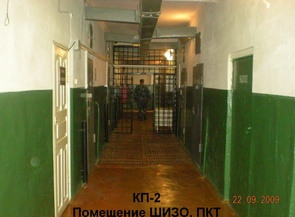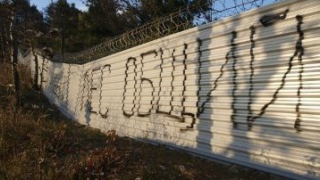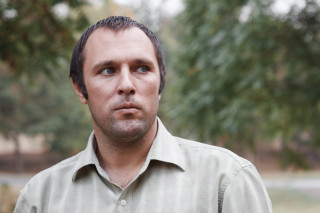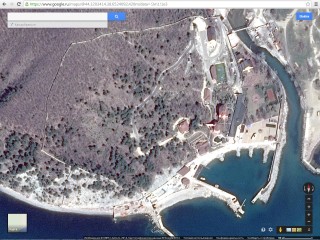
Bellona nuclear digest. May 2024
A survey of events in the field of nuclear and radiation safety relating to Russia and Ukraine.
News

Publish date: August 5, 2014
News
Yevgeny Vitishko, the Russian environmental activist whose strident opposition to illegal builds outs and waste dumping surrounding the Sochi Winter Olympics in led to prison, has declared a hunger strike from his Gulag colony in the Tambov region south of Moscow.
Meanwhile, a two-year old official Bellona inquiry has revealed that key evidence against Vitishko was never presented at trail – something that could be seen as exculpatory. Indeed, officials went so far in their response to Bellona as to say they have no record of the evidence’s existence, lending further credence to the environmental activist’s assertion that he’s been prosecuted on purely political grounds.
The latest hunger strike marks Vitishko’s second since he was imprisoned in February on a variety of trumped up charges leveled against him by Russian authorities who tarred him for besmirching the image of Russia’s showcase Olympics in the eyes of the international community.

That month, Vitishko sought to overturn a three year suspended sentence leveled against him and his colleague at Environmental Watch on the Northern Caucasus, Suren Gazaryan in 2012 for allegedly dismantling parts of and spray painting on a construction fence surrounding the mansion of Alexander Tkachev, governor of the Krasnodar region where the Sochi Games took place earlier this year.
Tkachev’s mansion, according to a damning Olympic environmental report released by EWNC during the Games, had been built on protected lands. But, both Vitishko and Gazaryan are said by witnesses interviewed by Bellona not to have participated in any spray painting.
In separate interviews to Bellona earlier this year, however, neither denied dismantling a section of the fence, which was preventing access to the general public to public lands and beaches on the coast of the Black Sea.
The fence that isn’t there
Ironically, an official inquiry sent by Nikolai Rybakov, director of the Environmental Rights Center (ERC) Bellona in St. Petersburg to Krasnodar Regional officials revealed they were unable to locate the fence or document its existence in forestry records.
Bellona’s inquiry stemmed from Gazaryan’s initial 2011 request to a Krasnodar Regional Court about the legality of building the construction fence on public, protected lands. In reply, Gazaryan received a letter from officials saying that the fence couldn’t be found, and they were thus unable to rule on its legality.

Shortly after Gazaryan received his letter, Bellona sent a second inquiry to the Russian Prosecutor General’s office with an identical inquiry.
Early this week, more than two years after the Bellona request was sent, an answer finally arrived from prosecutors (in Russian) with a nearly identical answer to that received by Gazaryan – they were unable to confirm the fence’s existence.
ERC Bellona has initiated an appeal with the Prosecutor General’s office, demanding a new investigation into the illegally built fence, which, as it happens, is clearly visible on a Google maps satellite image of the region (map in Russian).
Gazaryan’s flight from Russia
After the fence sentence and trumped up attempted murder charge charged piled up against Gazaryan, he was forced to flee Russia for Estonia and later Germany. He received one of this year’s prestigious Goldman Environmental Prizes.

Vitishko, an Amnesty International Prisoner of Conscience, remained in Russia and his appeal to have the suspended sentence reduced was met by an opposite outcome when the Kransnodar Regional Court on February 12 sentenced him to three years in a so-called settlement colony.
Vitishko, who was at the time being held in a jail in his home town of Tuapse, 180 kilometers to the south of Kransnodar, was only allowed to participate in the hearing against him via a crackly, barely audible video connection, constituting what his lawyers called a major procedural violation.
He was sentenced to the colony after two minutes’ deliberation by the judge.
Backlash against Vitishko for revealing prison conditions
On July 31 Vitishko, who has been active in attempting to clear his name and denies all wrongdoing, was tossed into solitary confinement at the Sadovaya settlement colony and promptly declared a hunger strike. He was released from solitary on Sunday, August 3, but continues his fast.
According to a release fro EWNC, Vitishko was punished by solitary confinement for “improper storage of groceries,” a punishment invoked against him by no less than the Tambov regional prosecutors’ office
Vitishko’s lawyers said that the regional prosecutors’ office had become impatient with numerous complaints about the treatment of he and other inmates are getting at the Sadovaya Colony. A visit by prosecutors to the colony to review Vitishko’s record ended with his assignment to solitary.

In mid June, Vitishko made public both to prosecutors and to the general public beatings and other forms of intimidation visited on other prisoners and himself. He also disclosed evidence of a prison riot that prison officials denied.
In a letter that Vitishko dictated to visiting activists in June, who in turn sent the letter to Bellona and other press, he called “the conditions of [his] incarceration unbearable.”
Upon his release from solitary, Vitishko found that his personal belongings and food had been sold off among other prisoners.
Officials reached by telephone at the Sadovaya Prison colony by Bellona confirmed that Vitishko’s personal affects had “disappear during his confinement in solitary.”
But an official who refused to give her name said the guards were blameless in the incident. But she said that because of the sleeping quarters’ open barracks-style construct that “it can’t be ruled out” that prisoners may have taken Vitishko’s property.
She said no investigation or forced return of Vitishko’s property was planned.
She had no comment on Vitishko’s health as his hunger strike continues. EWNC activists could not immediately be reached to assess Vitishko’s condition.
“It is very disappointing that Putin’s regime is still harassing Mr Vitscko, and the only reason for that is to scare other individuals in Russia from speaking the truth of what is going on in Russia,” said Nils Bøhmer, Bellona’s general manager. “Mr Vitishko’s work has shown the world the true environmental scandal the Sochi Olympic Games turned out to be.”

A survey of events in the field of nuclear and radiation safety relating to Russia and Ukraine.

But it’s unlikely to impact emissions from shipping along the Northern Sea Route.

In this news digest, we monitor events that impact the environment in the Russian Arctic. Our focus lies in identifying the factors that contribute to pollution and climate change.

The following op-ed, written by Bellona’s Charles Digges, originally appeared in The Moscow Times. In recent months, the Russian nuclear in...